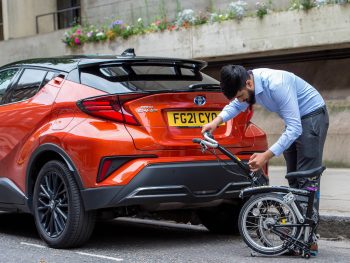Employees want less grey fleet travel and more multi-modal options
More than four in 10 (42%) of business travellers want better access to a mix of transport (multi-modal journeys) for work travel, rather than relying on grey fleet usage.

Some 85% of survey respondents think they and/or their employers should be incentivised to encourage multi-modal journeys
The research, published by Enterprise Rent-A-Car, also found that 85% think they and/or their employers should be incentivised to encourage multi-modal journeys, with tax breaks or similar rewards.
Currently, only 18% use multi-modal transport for work – less than half the 36% who make many multi-modal trips for leisure purposes.
But nearly two-thirds of those surveyed (64%) say their companies don’t currently encourage – or they don’t know if they encourage – multi-modal travel, with most relying on employees to use their personal car for work trips (87%).
When asked why they had used multi-modal journeys, respondents said because they were less expensive (33%), fast (27%), relaxing (22%), more environmentally friendly (20%) and safe (20%).
Oz Choudhri, head of mobility solutions – UK & Ireland at Enterprise, said: “The private car still has a role to play in business travel, but there is an opportunity to increase multi-modal journeys, as today nearly six out of 10 work trips are being made in private cars.
“Companies may be missing out on opportunities to reduce costs, risk and environmental impact while improving employee retention by giving more flexible, accessible and affordable mobility options.”
The research, carried out among 1,000 UK office workers who carry out domestic travel for business, also shows rental car and car clubs are a key player in multi-modal business travel.
Those surveyed said that, on average, nearly seven out of 10 (68%) of their business journeys were not possible by public transport alone.
Choudhri added: “This new research highlights that there is now a great opportunity for the establishment and growth of the shared mobility ecosystem. This could result in the creation of even more multi-modal mobility hubs, where workers are able to pick up a car when and where they need one, whilst using other modes of transport as part of the same trip.”
One in five (21%) of respondents said they lived within easy walking distance of a car rental branch and one in four (24%) within easy walking distance to a car club vehicle, suggesting that some form of multi-modal journey involving rental may be possible for millions of office workers in the UK.
UK car club usage continues to rise
Separate research has also been published this week showing that car clubs across the UK helped remove tens of thousands of private vehicles from the road last year and support more than 750,000 people in moving towards a “low-car lifestyle”.
The annual study by national shared transport charity Collaborative Mobility UK (CoMoUK) also found that car club membership numbers are more than double their pre-pandemic level, with users citing cost savings, convenience and reducing their own carbon footprint.
CoMoUK said the results showed car clubs reduce congestion, cut emissions, and help those with health problems and low-income families access convenient and affordable transport.
Richard Dilks, chief executive of CoMoUK, said: “All of this is why if the UK is to meet its net zero targets, the role of car clubs will be increasingly significant, as is recognised by the Committee on Climate Change.”
CoMoUK’s Car Club Annual Report UK 2022 for London can be found here.












